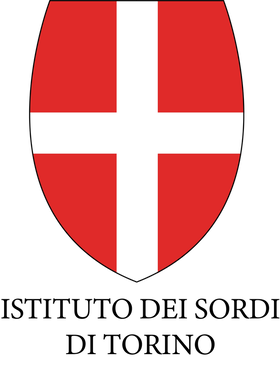
The institution is located in the north-west of Italy and operates at a regional and national level about services and at international level for special projects. Founded in 1814, the Turin Institution for the Deaf is an institution providing a wide range of services and activities, for deaf, hard of hearing and other linguistic and cognitive impaired children and adults.
In Italy, with the end of the seventies, the evolution of legislation in the education sector and the changing of the pedagogical orientations give rise to a profound crisis of special institutions, which in the next decade numerous close. The management of the Institute decides to adjust their offer: the boarding school was closed and the special schools opened to hearing children. Moreover, an innovative educational service for deaf students in the mainstream was inaugurated.
The Institute's activities are not limited to blind, deaf and hard-of-hearing students: as required by the Statute from the beginning, training courses, conferences, seminars and publications are provided for teachers, educators, parents and health workers. With this in mind, the Institute aims to become, in addition to a centre of service, an important place of thought, research, reflection, meeting and of exchange of ideas.
The core of the Institute’s activity has always relied on Education, particularly developing ad-hoc learning programmes for blind, deaf and hard-of-hearing students, while at the same time training teachers to deal with this kind of disabilities in their classrooms.
Today, the range of services provided includes:
- Adult education for deaf and hard of hearing (blind and Specific Language impairment);
- Vocational training and vocational guidance for young deaf (cooking and gardening), blind, autistic and other disabled adult students;
- Speech therapy and SLI programs and early intervention programs;
- Recognized National Provider of training for teachers; other training activities for speech therapists, nurses, educators and other professionals
- Home housing for deaf adults at risk of multiple discriminations;
- Kindergarten for Deaf and hearing children (with national ID as formal school age 2-6 yo);
- Special need teachers and educators service in mainstream schools supporting students in collaboration with the local social services and school authorities;
- Specialized library and documentation center for teachers and parents;
- Special projects for the inclusion of deaf people in the society in the view of universal accessibility, with a focus on museum and cultural institutions;
- Projects with the Universities in the fields of researches, language rehabilitation and social services; European and international projects;
- Specialized mentoring and tutoring for students with disabilities enrolled in the 3 public universities of the region;
- Language classes: Italian, English, sign languages;
- Sensorial Garden;
- European Solidarity Corps;
- Counseling to public employment services;
- Online web TV managed by Deaf people about information from all over the world on four different topics (news, culture, kids, deaf community);
- Deaf Academy: training courses about different topics for people using Sign Language.
In Italy, with the end of the seventies, the evolution of legislation in the education sector and the changing of the pedagogical orientations give rise to a profound crisis of special institutions, which in the next decade numerous close. The management of the Institute decides to adjust their offer: the boarding school was closed and the special schools opened to hearing children. Moreover, an innovative educational service for deaf students in the mainstream was inaugurated.
The Institute's activities are not limited to blind, deaf and hard-of-hearing students: as required by the Statute from the beginning, training courses, conferences, seminars and publications are provided for teachers, educators, parents and health workers. With this in mind, the Institute aims to become, in addition to a centre of service, an important place of thought, research, reflection, meeting and of exchange of ideas.
The core of the Institute’s activity has always relied on Education, particularly developing ad-hoc learning programmes for blind, deaf and hard-of-hearing students, while at the same time training teachers to deal with this kind of disabilities in their classrooms.
Today, the range of services provided includes:
- Adult education for deaf and hard of hearing (blind and Specific Language impairment);
- Vocational training and vocational guidance for young deaf (cooking and gardening), blind, autistic and other disabled adult students;
- Speech therapy and SLI programs and early intervention programs;
- Recognized National Provider of training for teachers; other training activities for speech therapists, nurses, educators and other professionals
- Home housing for deaf adults at risk of multiple discriminations;
- Kindergarten for Deaf and hearing children (with national ID as formal school age 2-6 yo);
- Special need teachers and educators service in mainstream schools supporting students in collaboration with the local social services and school authorities;
- Specialized library and documentation center for teachers and parents;
- Special projects for the inclusion of deaf people in the society in the view of universal accessibility, with a focus on museum and cultural institutions;
- Projects with the Universities in the fields of researches, language rehabilitation and social services; European and international projects;
- Specialized mentoring and tutoring for students with disabilities enrolled in the 3 public universities of the region;
- Language classes: Italian, English, sign languages;
- Sensorial Garden;
- European Solidarity Corps;
- Counseling to public employment services;
- Online web TV managed by Deaf people about information from all over the world on four different topics (news, culture, kids, deaf community);
- Deaf Academy: training courses about different topics for people using Sign Language.



